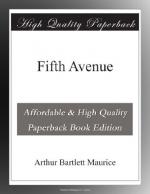But nearer at hand was the “Beach at Rockaway,” sung by the military poet, George P. Morris, and Coney Island. At the latter resort conditions were primitive. Unheard were the blaring of bands, and the raucous cry of the “Hot-Dog man,” and the riot and roar of the rabble. Mr. Blinker, of O. Henry’s “Brick Dust Row,” could not then have seen his vision and found his light. For there was no mass of vulgarians wallowing in gross joys to be recognized as his brothers seeking the ideal. But he might have been as well pleased with the unpretentious hotel at the water’s edge, where the urbanite could enjoy the cooling ocean breezes, and listen to the waves, and dine upon broiled chicken and succulent clams.
The press of the third decade of the last century was high-priced and vitriolic. Of the morning papers now known to New Yorkers there was none. The “Sun,” the first to appear, began in 1833. But of the afternoon journals there was the “Evening Post,” perhaps even then “making virtue odious,” as a wit of many years later was to express it, and the “Commercial Advertiser,” now the “Globe,” the oldest of all metropolitan journals. Before the appearance of the “Sun,” the morning papers had been the “Morning Courier and New York Enquirer,” the “Standard,” the “Democratic Chronicle,” the “Journal of Commerce,” the “New York Gazette and General Advertiser,” and the “Mercantile Advertiser and New York Advocate.” In the evening there were the “Star,” and the “American,” besides the “Post” and “Commercial Advertiser.” These newspapers were mere appendages of party, “organs” in the narrowest and most restricted sense, espousing blindly certain interests or ideas, expounding in long editorials the views of small groups of politicians.
“Here’s this morning’s New York Sewer! Here’s this morning’s New York Stabber! Here’s the New York Family Spy! Here’s the New York Private Listener! Here’s the New York Peeper! Here’s the New York Plunderer! Here’s the New York Keyhole Reporter! Here’s the New York Rowdy Journal! Here’s all the New York papers! Here’s full particulars of the patriotic Locofoco movement yesterday, in which the Whigs were so chawed up; and the last Alabama gouging case; and the interesting Arizona dooel with bowie knives; and all the political, commercial, and fashionable news. Here they are! Here they are! Here’s the papers! Here’s the papers! Here’s the Sewer! Here’s the New York Sewer! Here’s some of the twelve thousand of today’s Sewer, with the best accounts of the markets, and four whole columns of country correspondence, and a full account of the ball at Mrs. White’s last night, where all the beauty and fashion of New York was assembled; with the Sewer’s own particulars of the private lives of all the ladies that were there. Here’s the Sewer! Here’s the Sewer’s exposure of the Wall Street gang, and the Sewer’s exposure of the Washington gang, and the Sewer’s exclusive account of a flagrant act of dishonesty committed by the Secretary




